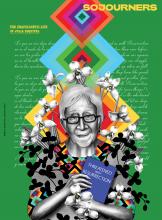FOR MUCH OF my life I thought of Lent primarily as a season of personal piety, a self-contained period of reflection on individual sin and repentance. This penitential practice was limited in both scope and duration: It had little to do with others apart from me and God, and its impact did not extend beyond Easter. I approached a central component of Lent—the fast—like a trial, a test of willpower that pitted God against some “thing” I had given up, often a food (usually cheese or dessert). Much to my chagrin, in this personal test of will, God did not always win out. Overall, I was grateful and relieved each year when Lent ended.
Two years ago, things changed. As a dairy and meat aficionado who unexpectedly found herself a convert to vegetarianism and pondering veganism, I suddenly had a new relationship with chosen fasts. (The cause: Eating Animals, a book on factory farms written by Jonathan Safran Foer, collaborating with Jewish ethicist Aaron Gross. Read at your own dietary risk.) Vegetarianism helped me engage fasting as something internally motivated by ethical and spiritual concerns, rather than externally imposed. Participating in my church’s annual Daniel Fast later that year deepened this new experiential understanding. Based on Daniel 1 and featuring weekly 12-hour periods with no food, this fast helped me experience how fasting is not about willpower, but surrender. It taught me about hubris, humility, and moment-by-moment reliance upon God, which often involved other people.
Read the Full Article

